
(Under) reporting Cop26
Suppose we were to host a football or rugby world cup or the Grand Depart of the Tour de France (Rishi Sunak is prepared to spend £30m on bidding for these competitions) and stars from across the globe beat a path to our door. Imagine the supplements and specials, the wall-to-wall coverage that would engender. You only have to look at how many trees are felled to provide the paper needed when these tournaments take place on foreign soil – or if there’s a royal birth, marriage or death – to know that it would be off the scale.
Yet, here we have more than 100 presidents and prime ministers gathered in Glasgow to spend two weeks talking about the issue that is generally accepted to be the most important in the world and only two papers think it worth a bit of extra newsprint. The Guardian ran 20 pages on Saving Planet Earth, while the FT featured stunning photographs on the threat of extinction in its Saturday magazine plus a 24-page supplement on managing climate change on Monday.
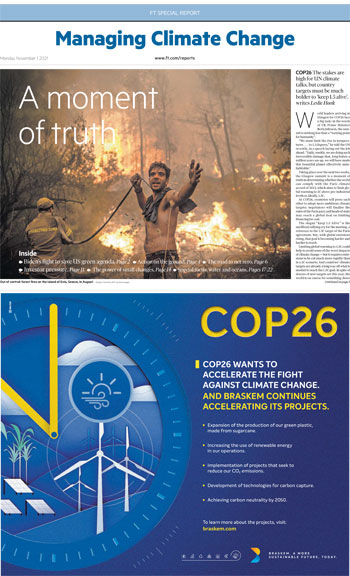
For the rest, Cop26 has produced a couple of splashes and maybe a few inside spreads. Broadcasters are doing specials all over the place, Sky has put on an extra channel. But London-based print is treating it as though it were just another set-piece news story, almost on a par with the Tory party conference. The Scots are doing more, presumably on the basis that it’s a “local” story. But is it?
What is going on here? Do editors – many of whom have been banging on about their papers’ green credentials – think readers aren’t interested? That climate change doesn’t sell papers? Look at the opinion polls: it’s right up there at the top of people’s global concerns, especially the younger adult audience papers need to woo to survive. A survey last week for Newsworks found that 69% of 2,000 people interviewed wanted news organisations to tackle misinformation about climate change, 67% wanted them to use their influence to raise awareness and to hold power to account and 60% wanted them to prioritise climate change over other issues.
Political or environmental
Before the conference started, Women in Journalism hosted a debate on how it should be covered. The Guardian’s environment correspondent, Fiona Harvey, urged editors to take a nuanced approach, to avoid triumph / disaster scenarios, to understand that seemingly small steps can be hugely significant. Then on Tuesday, veteran environment correspondent Geoffrey Lean suggested in Press Gazette that political editors might take a back seat to make way for specialists who knew their subject and – most importantly, since all the key work goes on behind the scenes rather than on the main stages – had the expert contacts to find out exactly what was happening, analyse and interpret developments. There was already evidence, he said, that political reporting was distorting the debate here in Britain, citing a ‘fascination’ with a small group of sceptical Tory MPs, a misunderstanding of how ‘green’ red wall constituencies are, and a focus on the costs rather than benefits (including financial) of moving to net zero. This all makes sense. Only the night before reading this piece, I had been wondering why Laura Kuenssberg was the lead reporter on the BBC News coverage, as though this were a British political occasion rather than a global environmental event. Where was Roger Harrabin?
Of course Harvey’s and Lean’s words fell on deaf ears. The weekend papers were far more concerned about the French fishing war than the build-up to the summit. And once it started, the dailies grasped all the easy angles: the royals, the “hypocrisy” of leaders flying in on private jets, Greta Thunberg, outrage at the Archbishop of Canterbury, Boris Johnson’s speech, with brief nods at the early agreements on methane and deforestation.
But that’s what happened, what more do you want?
Insight, context please. Not swipes at Nicola Sturgeon.
The environmentally conflicted Mail, which campaigns against single-use plastics and also against green fuel taxes, tried to get a handle on things by commissioning a poll of its own. That concluded that people wanted to be greener – so long as it didn’t cost them anything or inconvenience them. What was the point of sacrifice if China wouldn’t play ball? Individual efforts wouldn’t make any difference.
The weekend papers were far more concerned about the French fishing war than the build-up to the summit.
Information shortfall
But maybe with a bit more information that view would change. Over the past year, meat eating has declined by 17%. People are willing to make changes to their lives. But this isn’t the moment to focus on “what you can do” – the go-to approach for editors trying to make news “relevant” to their readers. It’s time to take a longer view of the bigger picture, to present the situation as it stands and as it is likely to develop, to show the evidence in an understandable way and then let readers draw their own conclusions about what they might and should be doing. It has worked in the past – remember how Michael Buerk’s reports from Ethiopia inspired Band Aid and Live Aid. And if the reporters / editors covering the conference are short of ideas, perhaps they could read the excellent Guardian or FT supplements for inspiration.
Waning interest
In the meantime, here’s a quick audit of the coverage since Saturday.
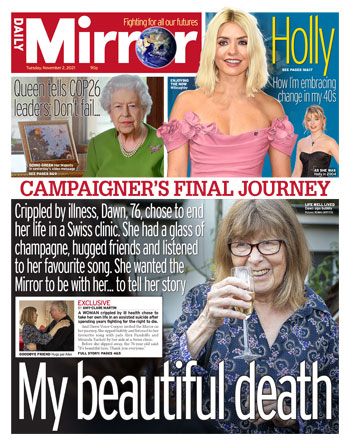
The paper that most disappointed me – in the sense that I had hoped for better – was the Mirror. On Monday, sporting a globe as the ‘o’ in Mirror, it had splashed with ‘Heat is on’ with a desperate wildfire picture under the strap ‘Summit to save the world’ (The same photograph, taken on the Greek island of Evia in August and widely used at the time, featured on the front of the FT supplement cover that day and also made it to the front of the Guardian yesterday). By Tuesday, world-saving had apparently been ticked off, or at least moved down the to-do list. The globe was still there, but the summit – as represented by the Queen’s message – was reduced to third slot, behind a couple of pictures of Holly Willoughby. The lead ‘My beautiful death’ was about a woman’s assisted suicide. The main image was of her raising a final glass with text superimposed: “Crippled by illness, Dawn, 76, chose to end her life in a Swiss clinic. She had a glass of champagne, hugged friends and listened to her favourite song. She wanted the Mirror to be with her…to tell her story.”
Now I’m not saying this was not a valid story or that it isn’t timely, given the legislation going through Parliament. But Dawn was far from the first person to have their death in Switzerland documented on a redtop front page. Nowhere in the copy did it say when all this happened. Was it on Monday? Or had she died some time before? Was there any real imperative to lead on this story that day?
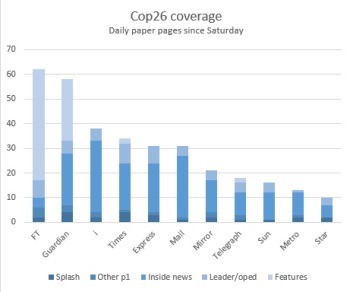
Or did the paper just not have a clue how to make the summit ‘interesting’ and so it put it on the 8-9 spread, majoring on Johnson’s speech and the Queen’s video. By yesterday, the summit presence on the front had got smaller – a puff alongside the titlepiece taking up about half the space devoted to the world’s fattest man needing therapy. Once again, inside coverage was restricted to the 8-9 spread.
The Mirror was not alone in losing interest. The Sun has preferred Simon Cowell and Richard Madeley, the Mail smart motorways and nasty policemen, the i smart motorways and vaccines (of course), the Telegraph Brexit wrangling and getting Owen Paterson off the hook. But if you can splash on non-news and speculation on coronavirus day in, day out, week in, week out for more than a year, then maybe you can find something to say for more than a day or two on saving the planet.
Three’s a crowd

One of the knee-jerk stories from the first day of the conference proper was Nicola Sturgeon’s encounter with Greta Thunberg. Greta is a superstar, so she’s always news. But she’s not the only young woman making a difference. We have room in our lives for more than one Prem ace, for more than one rock god, for more than one Hollywood icon. We should be able to cope with more than one climate activist.
As we see from the pictures here, Thunberg’s meeting with the Scottish First Minister wasn’t a one-to-one encounter. There were three of them there – think of it, perhaps, in terms of Sturgeon meeting the Ant and Dec of climate activism.
The third person at the table was Vanessa Nakate, a 24-year-old business graduate who has started three climate initiatives in her native Uganda, spoken at world events, and received international honours for her activities. She contributed to the FT’s Managing Climate Change supplement on Monday and will be speaking at a rally in Glasgow at the weekend.
Her book, A Bigger Picture: My fight to bring a new African voice to the climate crisis, was published last week. She could easily have made that subtitle “My fight to bring a new African face to the climate crisis” because last year the Associated Press cropped her out of a picture of five young climate activists at Davos – leaving just four white faces.
Nakate was understandably upset – because, as she said, it was as though an entire continent was being cropped out. Which was pretty symbolic, given wider concerns that Africa is being left out of the whole global warming debate, being “done to”, rather than having any agency of its own.
You might think that the ensuing controversy might have taught the media a lesson, but seemingly not. If it’s that hard, perhaps they might reflect on my Ant and Dec analogy and imagine Dec being excluded from the picture.
Because this is the photograph the i and Mail chose to print:
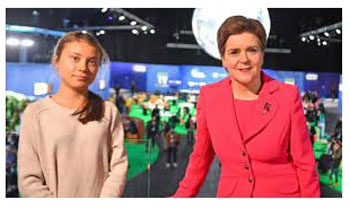
You might think that the ensuing controversy might have taught the media a lesson, but seemingly not.
The Budget: dancing to Sunak's tune
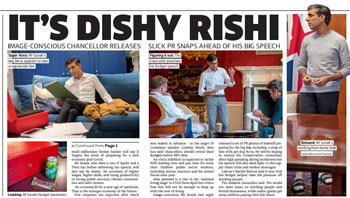
In November 1947, Hugh Dalton gave a journalist details of his Budget speech shortly before sharing them with Parliament. Needless to say, the journalist published. Dalton apologised to MPs for his “grave indiscretion” and resigned. In October 2021, Rishi Sunak gave dozens of journalists details of his Budget speech before sharing them with Parliament. Needless to say, they all published. Unlike Dalton, Sunak was taken to task by the Speaker. Unlike Dalton, Sunak did not apologise – instead he carried on briefing. And unlike Dalton, Sunak certainly made no offer to resign.
The Speaker was not alone in expressing disquiet about the extensive briefing that preceded last week’s Budget. Journalists, too, were uncomfortable. Michael Crick tweeted before the weekend that he had received half a dozen embargoed press releases. By Monday, Martha Kearney was noting on the Today programme that a dozen emails had landed over the weekend. Sunak also gave before-the-event interviews to the Times, the Sunday Express, Andrew Marr and Times Radio, among others. Then there were all the photo opportunities, the expensive flipflops worn with socks, the strategically placed Sprite and Twix, the dog-cuddling-while-reading-laptop-on-the-sofa and standing-with-papers-and-pointing-with-pen poses.
This was brand Rishi’s rolling PR offensive. And it was offensive to those who think Parliament is not getting the respect it deserves. He was using the media and the media knew it. But what could they do? Ignore the “official” leaks and deny readers the stories that would affect them? There was no way to take the high ground. And, naturally, all the leaks were the “good news”, so the reports were always going to be unbalanced. With all those “dishy Rishi” and “boomtime” headlines what could possibly go wrong?
But what could they do? Ignore the “official” leaks and deny readers the stories that would affect them?
Cheaper beer: will anyone notice?
But when it came to the day, so much had been trailed that virtually the only new news was the change to alcohol duty that would cut the price of a pint by 3p in a couple of years’ time. How much do you pay for a pint in your local? £3.50? £4? £4.50? Can you be more precise, say to the nearest 10p? In other words, would you notice if it changed by threepence tonight, let alone in 2023?
The Chancellor and his boss knew (or thought they knew) what would grab the headlines, posed with their pints and just waited for the “Cheers!” headlines to roll in. The Express and Metro duly obliged, but the rest were less compliant.
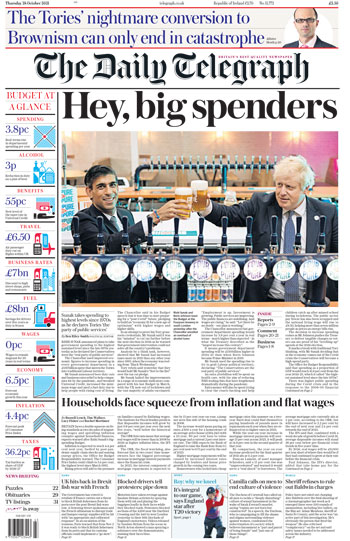
The Mail went for “The drinks are on us” – but who was the “us”? Johnson and Sunak, pictured rolling out the barrels, or the readers? The Telegraph used the clinking glasses picture, but the “Hey big spenders” headline sounded more a warning than a celebration – especially combined with a puff accusing the Tories of a “nightmare conversion to Brownism” that could “only lead to catastrophe”.
The Times and FT – which both resisted the beer stunt photograph in favour of the traditional red case – and the Guardian all focused on the spending plans, while the i looked at the tax burden. There was also opprobrium, predictably, from the Mirror with “Champagne for the rich, pain for the poor” and from the Star, which returned to form with a spoof film poster for “The Hangover Part IV” carrying the tagline “Shortages, bills soaring, but don’t fret: Bozo & Rishi cutting beer by, oh, 3p”.
The Sun, whose Covid coverage has been almost obscenely pint-of-beer-in-the-pub obsessed, was so unimpressed that it consigned Sunak (with red case) to a tiny spending-angled puff and gave over the rest of the front to an Ed Sheeran exclusive.
Eighteen months ago, Sunak’s star was rising; Conservative MPs and Conservative papers saw him as the coming man, but grassroots party members had another favourite. Now the MPs and the Press are having doubts; they tolerated the borrowing and spending at the height of the pandemic, but they don’t like it now – and they certainly don’t like the taxation.
The Truss era could soon be upon us.
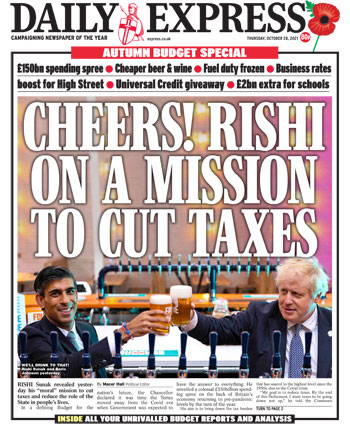
Tax cuts start tomorrow, promise
Until that day comes, the Chancellor can rely on the loyalty of at least one paper. The three days before the Budget brought this sequence of splash headlines from the Express: “Rishi: I’ll clear NHS Covid backlog for millions”, “8 million to get wage rise as Rishi makes work pay” and “Rishi: our new age of optimism”. But the one that knocked me for six was the one that came the day after the speech. “Cheers! Rishi on a mission to cut taxes”. Now here was a philosophy that “diet starts Monday” people like me could appreciate. As in “Woman at her heaviest, stuffing her face with cream cakes, on a mission to get down to size 10”.
The return of sleaze?
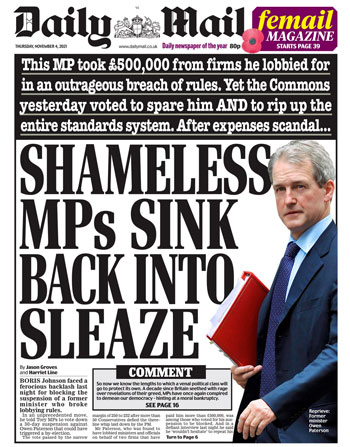
The Express was also loyal this morning, after the Commons vote to rip up the parliamentary standards system and save Owen Paterson from a 30-day ban for breaking the lobbying rules. “After two years of hell I can now clear my name,” said the puff, pointing to the story on page 7.
The Telegraph – the very paper whose MPs’ expenses scandal exposé led to the establishment of the system – was even more supportive, running a front-page story angled on Paterson calling for the standards commissioner to resign.
But these were lone voices amid the chorus of disapproval and the shouts of “sleaze”. The Sun hid the story on page 2, but still under the headline “Sleaze row MP in ‘stitch-up rage”. The Times played it straight in the splash “Tories rebel…” but went for the Prime Minister in its leader, saying it was time he paid a price for breaking convention.
You’d expect the Guardian and i to be outraged, but it is the Mail that Johnson needs to fear – and it pulled no punches with “Shameless MPs sink back into sleaze”. Inside it was “a dark day for democracy”. A dark day for the PM too.
You’d expect the Guardian and i to be outraged, but it is the Mail that Johnson needs to fear.
France – a love-hate relationship
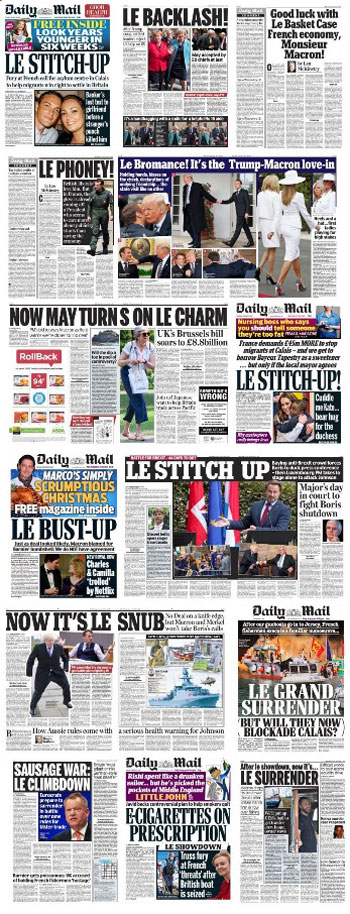
“France is a beautiful country wasted on the French,” a much-loved but deeply racist Times night editor once told me. He relished the wine, the pastis, and the cheese, the boulangeries and charcuteries; he admired the countryside, the elegance of the women, and the eclectic high streets, but he seemed to miss any connection between the things he liked and the people who created or nurtured them.
The same could be said of two expat couples I knew well. They had chosen to make their homes in France, one in the Pas de Calais, from where the husband commuted to Kent, the other 500 miles away in Tarn et Garonne in the southwest. Yet they were forever griping about “the French”. Nothing they did could match the Brits: their tradesmanship, their bureaucracy, their general demeanour. Which begged an obvious question, the answer to which was “It’s much cheaper.” So they kept their money in their pockets and kept on sneering, certain in the knowledge of their English superiority.
It’s strange that of all the conversations I had with Arthur over years at the Times, that one almost exactly 40 years ago should stick in my mind. Now I wonder if it was because it so encapsulated a prevailing attitude: our closest neighbours, friends in time of need, enemies the rest of the time.
It certainly encapsulates the attitude we see in our papers. “Win a gorgeous chateau”, “20 best gites”, “Eurostar for £20”, cry the weekend puffs, while the news pages rail at the latest Elysée outrage. As the coronavirus disrupted everything last year, the papers fumed at France for shutting its doors to us, while simultaneously trying to reassure readers that they would soon be back aboard Le Shuttle. You’d think that if the French were so inhospitable and unreasonable, we wouldn’t want to go there. But we do. And the papers know it.
Still, they carry on stoking the enmity, as indeed they do on the other side of the Channel. We may have reined back on calling them Frogs, but there seems to be no shortage of people, even in government, who still refer to us – with contempt rather than affection – as Les Rosbifs. And, as ever with squabbling neighbours, we are now busy fighting over something that really doesn’t matter a jot to either of us.
Much ado about fishing
Fishing is a tiny industry. In this country, it is dominated by five families, it employs barely 12,000 people and contributes just 0.1% to the UK economy. But it was fishing, rather than our far more lucrative and internationally respected film and finance sectors, that was the sacred cow of Brexit. And it hasn’t worked out quite as fishermen think it should have.
The same goes for the French: the industry over there is even smaller as a contributor to the public purse – just 0.06% – but it, too, was the key factor in the trade negotiations. And it hasn’t worked out quite as the French fishermen think it should have.
The current spat is, on the face of it, about licences for 55 boats. But it isn’t. Just as they were in the referendum campaign and in the trade talks, the fishermen – British and French – are pawns (or should that be prawns?) in a bigger political game (or stew), a stew with extra chillies to add heat and spice, courtesy of the upcoming French presidential elections.
And since we love a bit of fire in our relationship with the French, our Press has been having a field day. Especially with that leaked letter from French Prime Minister Jean Castex to Ursula von der Leyen saying the EU had to make clear “that leaving the union is more damaging than remaining in it”. Aha! This proved what the Express, Telegraph and Mail (not to mention Jacob Rees-Mogg and friends) had been warning us for years: “UK must be punished for Brexit, says France”, as the Telegraph splash put it on Saturday.
As with the fishing deal itself, this is all a matter of interpretation. Castex did not write that the Brits should be punished, but to some papers the inference was clear. To others it was equally clear that he was stating the obvious: that you make your choice, you stick by what you agreed, and if you leave the club you can’t expect to keep the benefits of membership.
There’s a difference between “we’ll be nasty to you if you leave” and “we won’t be as nice to you as if you had stayed”. If I no longer invite my neighbour for coffee and take back my house key, is she “punishing” me by not feeding the cat when I go on holiday or is that a reasonable consequence of my actions?
This one is going to run and run. And so, most probably, will the series of “Le” shorthand headlines. For the tabs – and the Mail in particular – the simplest way to indicate to the reader that this is a story about France is to stick “Le” in front of a random word (rather as the French do with “le weekend”). Above is a collection from the past five years of friendly rivalry. And, yes, there really have been three “Le stitch-ups”.
An abundance of secrecy
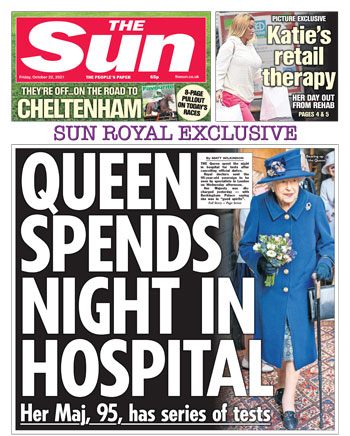
Congratulations to the Sun for its scoop on the Queen spending the night in hospital. Not everyone was admiring, though. The BBC’s Nicholas Witchell was clearly miffed at being beaten to the story and he spent much of his reporting on how he had been misled by the Palace, rather than on the monarch’s health.
On that, “She’s 95” was the best he could muster. That’s the problem when you are dependent on official sources – and on a beat where no one can really know what’s going on behind the scenes. Maybe he could have noted that, once it could no longer obfuscate about the hospital visit, the Palace had used the same phrases about “an abundance of caution” and “she is in good spirits” that were the official bulletins on the Duke of Edinburgh when he went to hospital early last year. It would probably have been in questionable taste, but it would have made a point about the unreliability and uninformative nature of most updates.
The Mail was just as upset as evidenced by the focus of its next-day coverage on the Palace smokescreens – turning a natural desire for privacy into a constitutional scandal.
Of course, the Queen’s state of health is a matter of genuine public interest and we shall never know if the Palace would have been able to keep its hospital secret had a snitch not made that call. But that’s why the Mail shouldn’t worry. There’s always going to be someone willing to make that call and the Palace will always have to answer the awkward questions that ensue. Some things can’t be kept under wraps forever.
Bashir interview – an unreasonable request
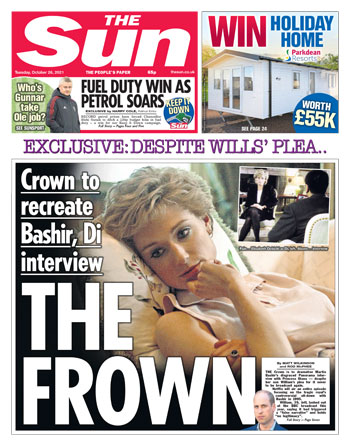
There was less to applaud in the Sun’s splash “Crown to recreate Di Bashir interview”. What do they expect? I have to confess to never having seen a single episode, but I understand that this is a dramatised version of a sequence of real events. That interview was a key moment both in the Princess’s life and for the public perception of the royal family. How could it be left out? Would it be right to edit Enoch Powell’s Rivers of Blood speech out of a dramatisation of 1960s politics because of the damage and hurt it caused?
The Sun’s displeasure is reinforced by the overline that the interview will be included in the series “Despite Wills’ plea” and the inside headlines “Netflix to defy Wills…” and “Crown ignores Prince’s plea”. The Duke hasn’t, so far as we know, actually contacted Netflix to make any request that is being either ignored or defied. This angle is based on his (misguided) assertion last year that the real interview should never be aired again.
Much as it may surprise the Sun, the royal family does not – and should not – have sovereignty over what independent television companies – here or in America – broadcast. It’s called freedom of expression. It’s what newspapers purport to cherish.
When the report into Martin Bashir’s behaviour was published, the Duke, his uncle and BBC-hating newspapers immediately drew a direct line from the interview to the Princess’s death. If that claim were justified (I don’t believe it is), that would surely increase, rather than remove, the imperative for the interview to be included in the series.
Yet, while it insists on its own freedom to publish what it likes, the Sun now apparently wants other outlets to airbrush history. That is exactly the sort of thing it gets upset about when “woke warriors” object to statues of colonialists and slave traders or when the National Trust wants to give its visitors a more rounded history of its properties. The interview happened – the Sun even quoted from it in its “Netflix defies Wills” story. Ignoring it won’t make it unhappen.
While it insists on its own freedom to publish what it likes, the Sun now apparently wants other outlets to airbrush history.
Halyna Hutchins – say her name
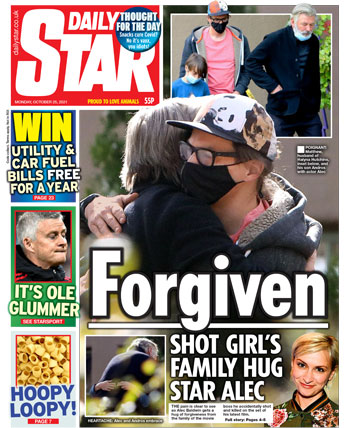
Alec Baldwin’s fatal shooting of Halyna Hutchins last month was one of those shocking stories that take your breath away. It was naturally front-page news for days – although the decision by some papers to run publicity pictures of Baldwin in costume soaked in fake blood was distinctly questionable. I also felt uneasy about the picture of the props woman posing with crossed guns. This may have happened on a film set, but these were real people in a truly tragic situation.
And while the “What have I done?”, “Why was I given a hot gun?” lines were understandable, they added to the impression that sympathy here was for Baldwin, the man familiar to readers, rather than for Hutchins.
She may have lost her life, but the sense was that she was of interest only as a “supporting actor” in Baldwin’s drama; we learnt of her background and her career, if at all, only on the second inside spreads. This was the director of photography, a 42-year-old woman with more than 30 films to her credit, yet when the Star splashed on a photograph of Baldwin hugging her husband a couple of days later, her name didn’t even appear in the text. She was “the movie boss he accidentally shot and killed”. And for the headline? There she was “shot girl”. Come on, show a bit of respect. Please.
Front page of the fortnight
Two this week: the Scotsman had the most compelling newsstand front, while the Guardian showed its class with the cover for its Cop26 supplement.
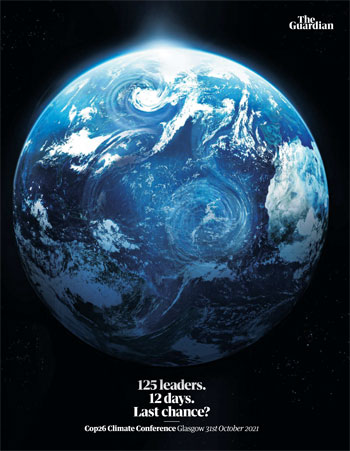
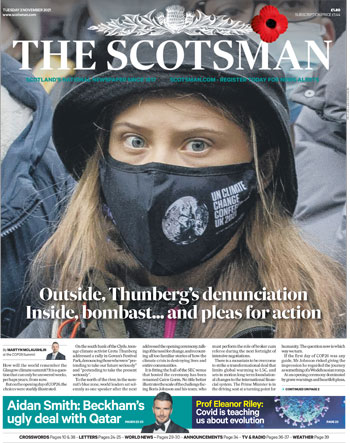
Liz Gerard’s Notebook is a fortnightly column published in the InPubWeekly newsletter. To be added to the mailing list, enter your email address here.












